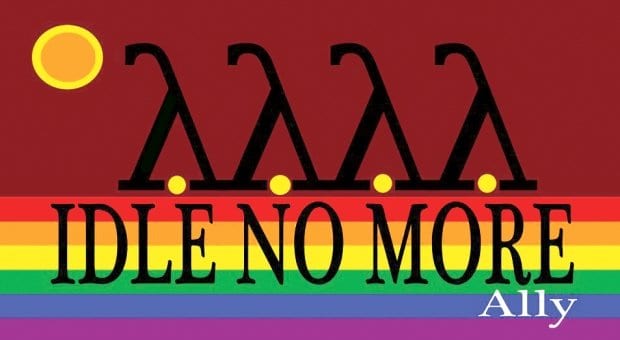
Alex Wilson is a professor of social justice and indigenous education at the University of Saskatchewan.
Two-spirit organizers of the Idle No More movement say they’re looking for more allies from the queer community in order to maintain momentum.
Indigenous peoples who oppose parts of the federal government’s omnibus Bill C-45, which they say ignores existing treaties and will negatively affect First Nations, Métis and Inuit communities, as well as the environment, lead the grassroots movement. Idle No More protesters gathered in Ottawa Jan 28 as MPs returned to the House of Commons.
“We’re talking about human rights and sovereignty,” says Alex Wilson, an organizer and a professor of social justice and indigenous education at the University of Saskatchewan. “I think that’s a place where the LGBTQ community can connect. This is a global issue that affects all of us.”
Queer people have histories of mobilization for social justice similar to Idle No More, says Melody McKiver, an administrator and videographer working with the movement in Ottawa. Wilson says she is frustrated that many people who are normally involved in politics have not asked about Idle No More.
“I wonder if they feel excluded or if they just don’t know enough, so they don’t feel comfortable asking,” she says.
Idle No More is not limited to indigenous peoples, McKiver says.
To welcome queer people as allies, artist Thomas Bruyere has created a graphic logo that includes them in the movement. “The graphic uses the lambda symbol that has been used in the past as a gay pride symbol. I thought it looked like a teepee,” he says.
The four teepees in the image symbolize the four founders of the Idle No More movement. At the bottom is a rainbow flag.
“What is also important is that it says ally. This is so anyone can use this symbol and feel included,” Bruyere says.
In Ottawa, queer-friendly sex shop Venus Envy spent four days collecting clothes, food, canned goods, blankets, letters of support, wood and cash donations for Idle No More, says Lara Purvis, the shop’s education coordinator. This was done in response to a call for supplies to help support participants, she says.
Most of the supplies were brought to hunger-striking Attawapiskat First Nation chief Theresa Spence’s camp on Victoria Island, Purvis says. But some of the extra clothes were taken to blockades outside of the city, she adds.
The response to the shop’s collection has been positive, she says. “People seemed happy to have a way to contribute to a cause that many might support, but aren’t and weren’t sure what they could actually do.”
One thing people can do is go to a rally or flash-mob round dance, McKiver says. “Putting your body on the line with others is a really powerful message, just going and offering your presence,” she says.
In fact, it’s crucial to have people who hold different points of view participating, Wilson says.
The founders of Idle No More are committed to a range of social-justice principles because sovereignty is impossible without the undoing of systemic forms of oppression like sexism, racism and homophobia, Wilson says.
Although two-spirit people have different roles depending on the particular indigenous community they belong to, a general understanding is that they encourage open-mindedness, Wilson and McKiver agree. They are necessary for a community to be balanced, Wilson adds.
McKiver, who is Anishinaabe with roots in the Lac Seul First Nation of northwestern Ontario, says that for her, being two-spirit is as much about gender roles as sexual orientation.
“If you look back to living on a trap-line, you wouldn’t have had the moment to think of whether a woman were to go out and hunt or tend to a fire or if a man were to – you do what you need to do to survive, and there shouldn’t be such rigidity in different gender roles.”
Anishinaabe cultural teachings emphasize a profound ethic of non-interference, McKiver says. In this climate, two-spirit people find ways to serve their communities that make best use of their talents and interests, regardless of existing gender roles, she says.
“It’s an issue of personal sovereignty and presenting yourself in the way that you feel comfortable. It can be a way of shaping dialogue and bringing other viewpoints to discussions,” she says.
Two-spirit people can help encourage political and personal transformation, Wilson says.
“There needs to be people that can kind of have that vantage point of standing in a doorway and you can kind of see the two sides. By two sides I don’t mean male/female; I mean the two sides of any kind of discussion that we’re having,” Wilson says.
Ultimately, Wilson and McKiver agree that Idle No More is about education. Before growing to include flash mobs and protests, it started with teach-ins that provided information about Bill C-45, Wilson says.
“For me, what’s been really energizing about Idle No More is creating dialogue in places where there hasn’t been a lot of dialogue,” McKiver says. “There’s so much ignorance about indigenous issues within Canada, and I think Idle No More is working to bring that to light.”

 Why you can trust Xtra
Why you can trust Xtra


